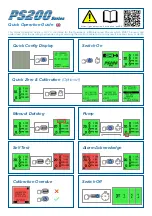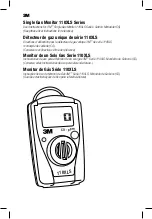
EL-2662
The EL-2662 is a gas alarm with an integrated transmitter designed for use with Electronics Line 3000’s supervised wireless range
of receivers. On detecting the presence of gas, the unit sounds an alarm and notifies the control panel.
The gas alarm has been designed to detect and provide early warning of the presence of natural (methane) and LP (propane, butane)
gases. The gas sensor has been calibrated to detect these combustible gases at concentrations below 15% of the L.E.L (Lower
Explosive Limit) – the level at which an air-gas mixture becomes explosive. Methane has an L.E.L. of 3.8%. Propane 2.1% and Butane
1.69%. (Source: UL 1484 Standard for Safety – Residential Gas Detector). The sensor detects methane at concentrations in excess of
0.5% and propane/butane at concentrations in excess of 0.503%.
IMPORTANT: Gas appliances should be installed or serviced by authorized personnel only. Always remember to close all gas-
operated household appliances when not in use. Familiarize your family with the alarm signal and instruct them on what to do
in the event of an alarm. The EL-2662 should be used as an integral part of a comprehensive safety program including
appropriate home, office and life insurance. The manufacturer makes no claim regarding the health hazard of gas and/or the
alarm’s ability to protect the user’s health in any way.
Mounting Location
The EL-2662 gas alarm will only function effectively if installed in the correct location.
Consider the following before mounting the gas alarm:
•
Choose a mounting location according to the following guidelines:
o
Methane (Natural) Gas: Since Methane is lighter than air, the greatest
concentration of gas will be immediately under the ceiling. The EL-2662
should therefore be installed on the wall about 15-20cm (6-12”) below the
ceiling. Do not install the gas alarm on the ceiling. If the ceiling is higher
than 2.6m (8’) or non-standard (e.g. sloped or gabled), seek advice from
your local gas company regarding the optimal mounting location.
o
Butane Gas: Since Propane and Butane are heavier than air, the greatest
concentration of gas will be at floor level. The EL-2662 should therefore
be installed about 10-15cm (4-6”) above the floor). Do not install the gas
alarm on the floor. Do not mount in a location where the gas alarm could
be damaged by dirt, liquids, jolting etc.
•
Install the gas alarm in close proximity to every gas-operated appliance.
•
Do not install the gas alarm directly on any gas appliance.
•
Do not install the gas alarm in sealed or closed compartments or in an area where a wall or divider obstructs the flow
of gas to the gas alarm. Anything obstructing the sensor could delay or prevent an alarm activation. An EL-2662 gas
alarm installed in the basement may not detect a gas leak on the first or second floor. A closed door may also prevent
gas on one side from reaching the sensor on the other side.
•
Do not install the gas alarm in locations where drafts or breezes (from fans, open doors, open windows etc.) may
prevent gas from reaching the sensor. The gas alarm will only detect gas in closed spaces when a significant amount
of gas has reached the sensor.
•
Do not install the gas alarm in any room where aerosols or ammonia are used (e.g. bathrooms).
Installation Instructions
Figure 2: EL-2662 (cover off)
1. Release the four screws on the back panel of the unit and remove the top cover.
2.
Apply battery power to the transmitter board by removing the dividers separating the battery from the contacts on the
battery holder.
Note: Due to the occurrence of voltage delay in lithium batteries that have been in storage, the batteries may
initially appear to be dead. In this case, leave the unit in Test mode for a few minutes until the battery voltage level is stabilized.
3. Install the Test jumper; the Transmission LED flashes slowly.
Internal
Sounder
Battery
Holder
Test
Jumper
Wire
Brace
Gas
Sensor
Transmission
LED
Power LED
Figure 1: Mounting Location
12V
Power Input




















